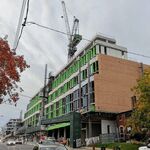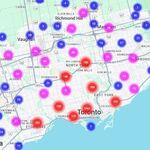Migos,
most people do not look to move in February, especially when there is a foot of snow on the ground.
I would like to see how fast these buildings rent and what is left say after May 1.
I don't know that Calgary will significantly affect Toronto, at least in the short term.
Oil has always been a boom/bust for Calgary. Oil prices will definitely affect it and if they stay low for 6 months or a year, I do believe homes, high priced ones especially and new condos will really hurt. I belive and perhaps may be corrected but Calgary and Alberta have had busts before without it affecting Toronto or Vancouver.
Migos: Thought this would be of interest further to what I posted here:
From the National Post today:
Low rates seen fuelling Toronto’s surging housing market as Alberta markets stall
Republish Reprint
Garry Marr | February 4, 2015 | Last Updated: Feb 4 8:16 AM ET
More from Garry Marr | @DustyWallet
While sales in Calgary and Edmonton are plummeting, Toronto home prices are up almost 5%, with realtors predicting more increases to come amid near record-low interest rates.
National PostWhile sales in Calgary and Edmonton are plummeting, Toronto home prices are up almost 5%, with realtors predicting more increases to come amid near record-low interest rates.
The average price of a home sold in Toronto in January climbed 4.9% to $552,575, according to the Toronto Real Estate Board which predicts more increases in 2015 amid near record-low interest rates.
Stampede to sell houses in Calgary underway as new listings, inventory soar
Bank of CanadaNervous Calgary homeowners put their homes on the market in January, well outpacing demand, and creating conditions that could lead to a price collapse. Read on
Sales in Canada’s largest city also remained strong and climbed 6.1% last month from a year earlier.
With the Bank of Canada cutting rates, which has put the prime lending rate at 2.85%, and five-year fixed rate mortgages below 2.5% at some financial institutions, the board’s head of analysis thinks there could be even more room for price growth.
“Home price growth is forecast to continue in 2015. Lower borrowing costs will largely mitigate price growth this year, which means affordability will remain in check. The strongest rates of price growth will be experienced for low-rise home types, including singles, semis and town houses. However, robust end-user demand for condo apartments will result in above-inflation price growth in the high-rise segment as well,” Jason Mercer, director of market analysis, for TREB, said in a statement.
The Toronto news follows a report from Vancouver which shows its market also remains strong even as Alberta sales have fallen drastically. New listings have spiked in Calgary and Edmonton and that is expected to put pressure on prices.
On Tuesday Edmonton reported sales were down 26% in January from a year earlier while Calgary reported a 39% decline during the same period. Meanwhile, Vancouver reported a strong 8.7% gain in sales last month from a year earlier with prices 5.5% during the same period.
Benjamin Tal, deputy chief economist with CIBC, said there is very little likelihood that the price decline expected in Alberta will affect the rest of the country.
“It’s very difficult to imagine a scenario where Alberta will have a significant effect on the rest of the country,” said Mr. Tal, referring to house prices.
In Toronto, there appeared to no impact as the average price of detached homes inches closer to $1-million. Prices in that category in the city rose 7% from a year to $948,713.
“The January results represented good news on multiple fronts. First, strong sales growth suggests home buyers continue to see housing as a quality long-term investment, despite the recent period of economic uncertainty. Second, the fact that new listings grew at a faster pace than sales suggests that it has become easier for some people to find a home that meets their needs,” said Paul Etherington, president of the board, in a release.
As all those people leave the oil projects and the migration goes from West back to East (at least that is what I am expecting), that may well put some support under the Toronto market at least in the short term
I know they quote Bank economists and realtors. With the usual caveats of vested interests I too believe that past history has taught us that Alberta can go down without it taking the rest of the country with it when oil busts. I guess we will have to see.
However, I do believe that since oil is such a large part of the Canadian economic growth now, it will affect. Also, the psyche in Toronto may be affected as Ontario is not doing well economically despite the lower dollar and the added burden of worrying about oil and its effect on the economy may affect prices here. However, I fear many buyers, especially newer younger ones, do not consider the greater macro picture to a significant enough degree.



